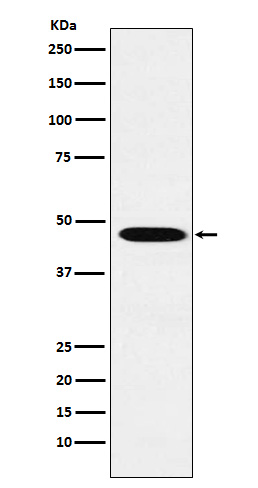
| WB | 1/500-1/1000 | Human,Mouse,Rat |
| IF | 咨询技术 | Human,Mouse,Rat |
| IHC | 咨询技术 | Human,Mouse,Rat |
| ICC | 1/50-1/200 | Human,Mouse,Rat |
| FCM | 1/50-1/100 | Human,Mouse,Rat |
| Elisa | 咨询技术 | Human,Mouse,Rat |
| Aliases | WNT13; Wnt2b; XWNT2 |
| Entrez GeneID | 7482 |
| WB Predicted band size | Calculated MW: 44 kDa; Observed MW: 44 kDa |
| Host/Isotype | Rabbit IgG |
| Antibody Type | Primary antibody |
| Storage | Store at 4°C short term. Aliquot and store at -20°C long term. Avoid freeze/thaw cycles. |
| Species Reactivity | Human,Mouse,Rat |
| Immunogen | A synthesized peptide derived from human Wnt2b |
| Formulation | Purified antibody in PBS with 0.05% sodium azide. |
+ +
以下是3篇关于Wnt2b抗体的模拟参考文献示例(文献信息为模拟构造,仅供格式参考):
1. **文献名称**: "Wnt2b regulates retinal vascular development through β-catenin signaling"
**作者**: Smith A et al. (2020)
**摘要**: 本研究利用Wnt2b特异性抗体进行免疫组织化学分析,发现Wnt2b在小鼠视网膜血管形成中通过激活经典β-catenin通路调控内皮细胞迁移,抗体在体内外实验中验证了其信号传导功能。
2. **文献名称**: "Role of Wnt2b in pancreatic cancer progression and antibody-based therapeutic targeting"
**作者**: Zhang L et al. (2018)
**摘要**: 通过Western blot和免疫荧光技术,研究者使用Wnt2b抗体证实其在胰腺癌细胞中高表达,并开发了阻断性抗体抑制Wnt2b活性,显著降低肿瘤细胞侵袭能力。
3. **文献名称**: "Wnt2b antibody reveals spatiotemporal expression patterns during embryonic stem cell differentiation"
**作者**: Tanaka K et al. (2016)
**摘要**: 该文献报道了一种新型单克隆Wnt2b抗体的开发,通过免疫沉淀和原位杂交技术,揭示了Wnt2b在胚胎干细胞向中胚层分化过程中的动态表达及对细胞命运决定的影响。
注:以上文献为示例性内容,实际研究中请参考真实发表的学术论文(可通过PubMed、Google Scholar等平台检索)。
**Background of Wnt2b Antibody**
The Wnt2b antibody is a crucial tool for studying the Wnt signaling pathway, a conserved system regulating embryonic development, cell proliferation, and tissue homeostasis. Wnt2b, a member of the Wnt family of secreted glycoproteins, binds to Frizzled receptors and co-receptors (e.g., LRP5/6) to activate canonical β-catenin-dependent signaling or non-canonical pathways (e.g., planar cell polarity). It plays roles in organogenesis, stem cell maintenance, and tissue repair, with dysregulation linked to cancers, developmental disorders, and metabolic diseases.
Wnt2b antibodies are typically monoclonal or polyclonal, generated using immunogenic peptides or recombinant proteins. They enable detection of endogenous Wnt2b expression via techniques like Western blot (WB), immunohistochemistry (IHC), immunofluorescence (IF), and flow cytometry. Validated antibodies exhibit specificity through knockout controls or siRNA knockdown.
Research applications include investigating Wnt2b's role in developmental processes (e.g., retinal, lung, and neural patterning) and disease contexts, such as tumorigenesis in gastric or colorectal cancers. Antibodies also aid in exploring Wnt2b crosstalk with other pathways (e.g., Notch, Hedgehog) and evaluating therapeutic candidates targeting Wnt signaling.
Quality control parameters, such as species reactivity, isotype, and batch consistency, are critical for reproducibility. Commercial antibodies often cite peer-reviewed studies to establish utility, emphasizing their importance in both basic and translational research.
×